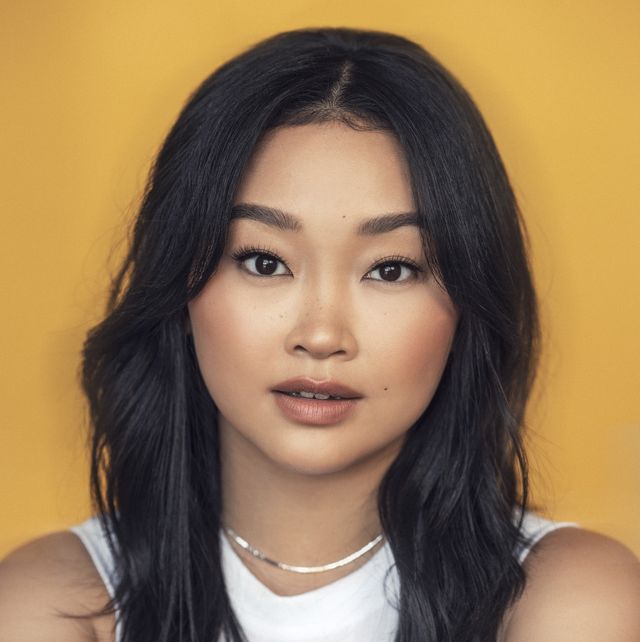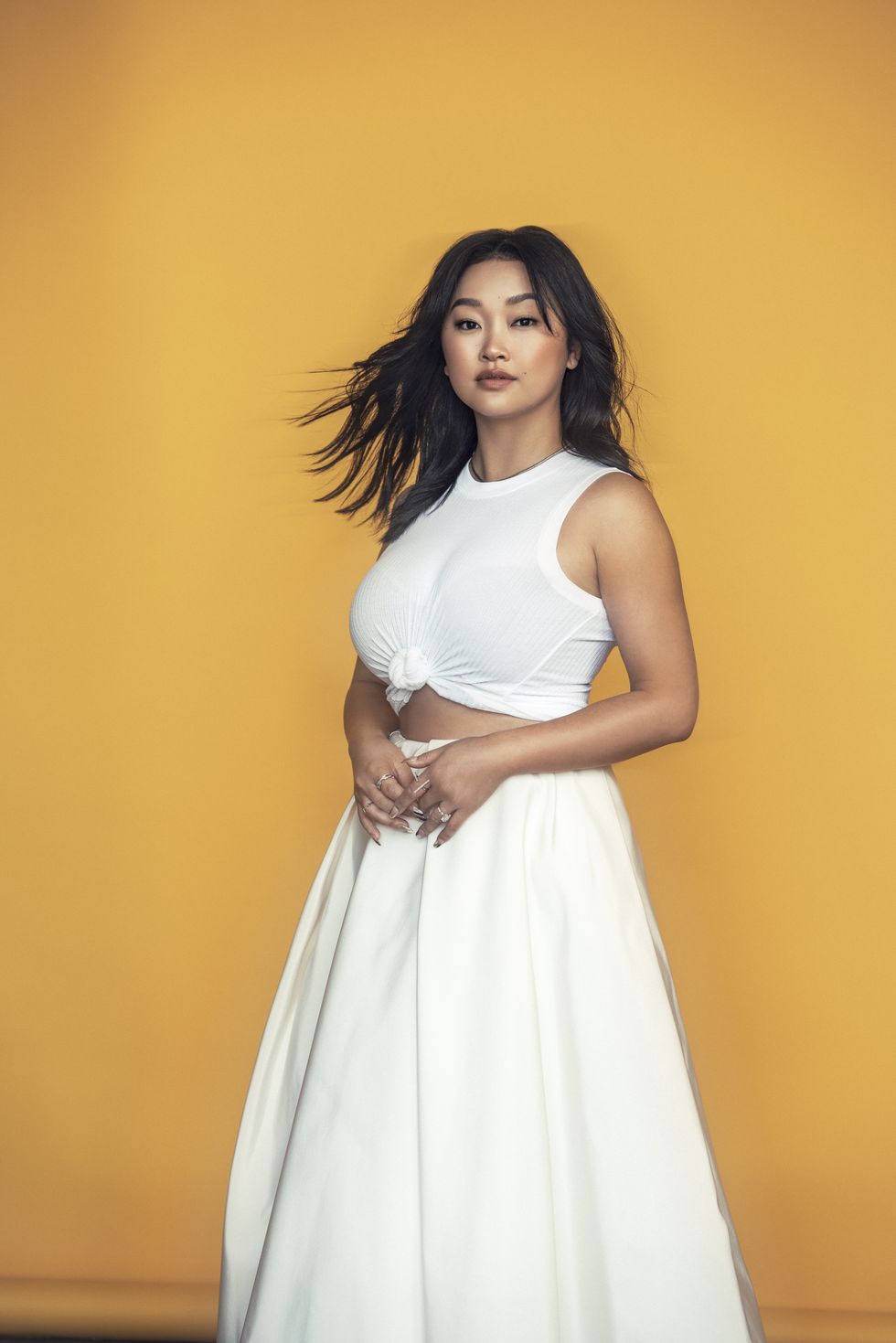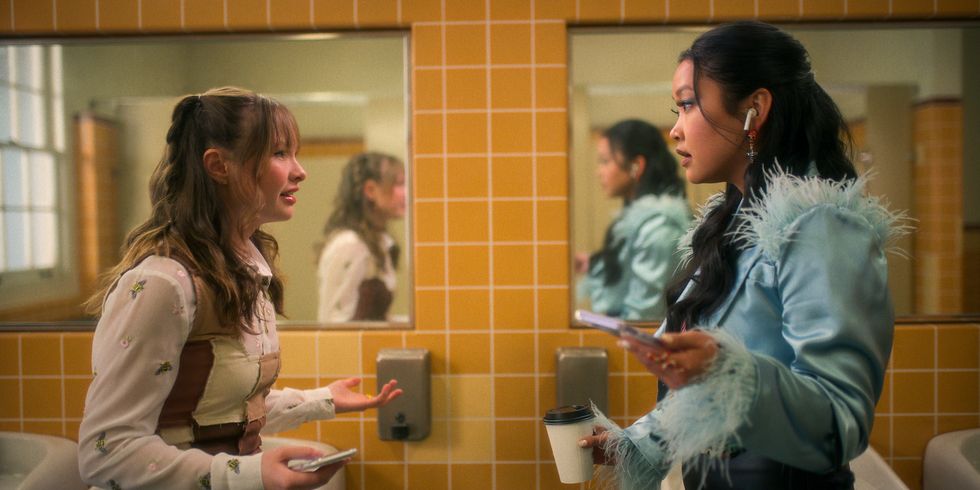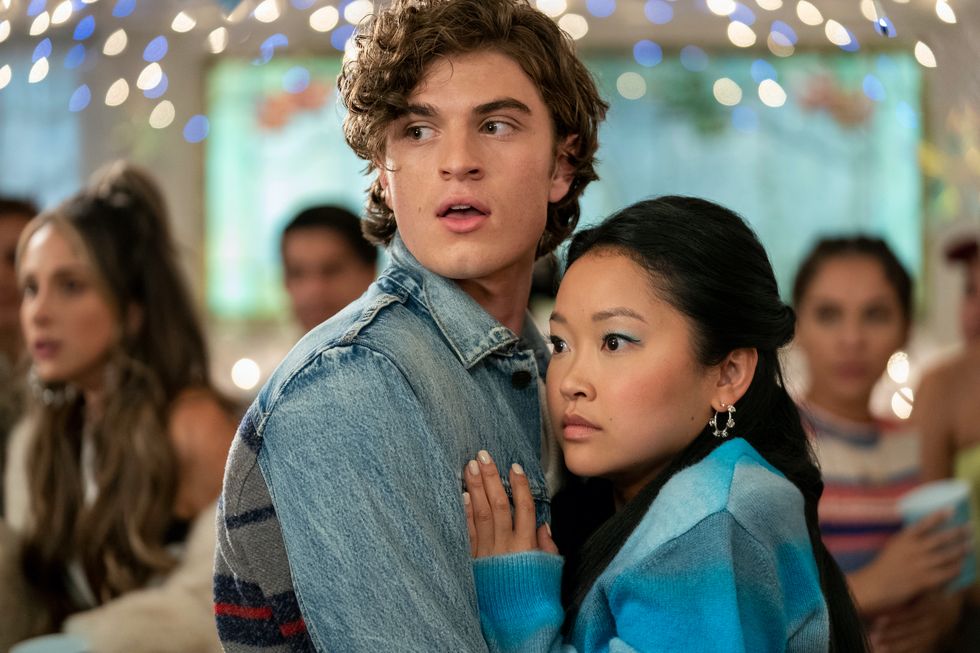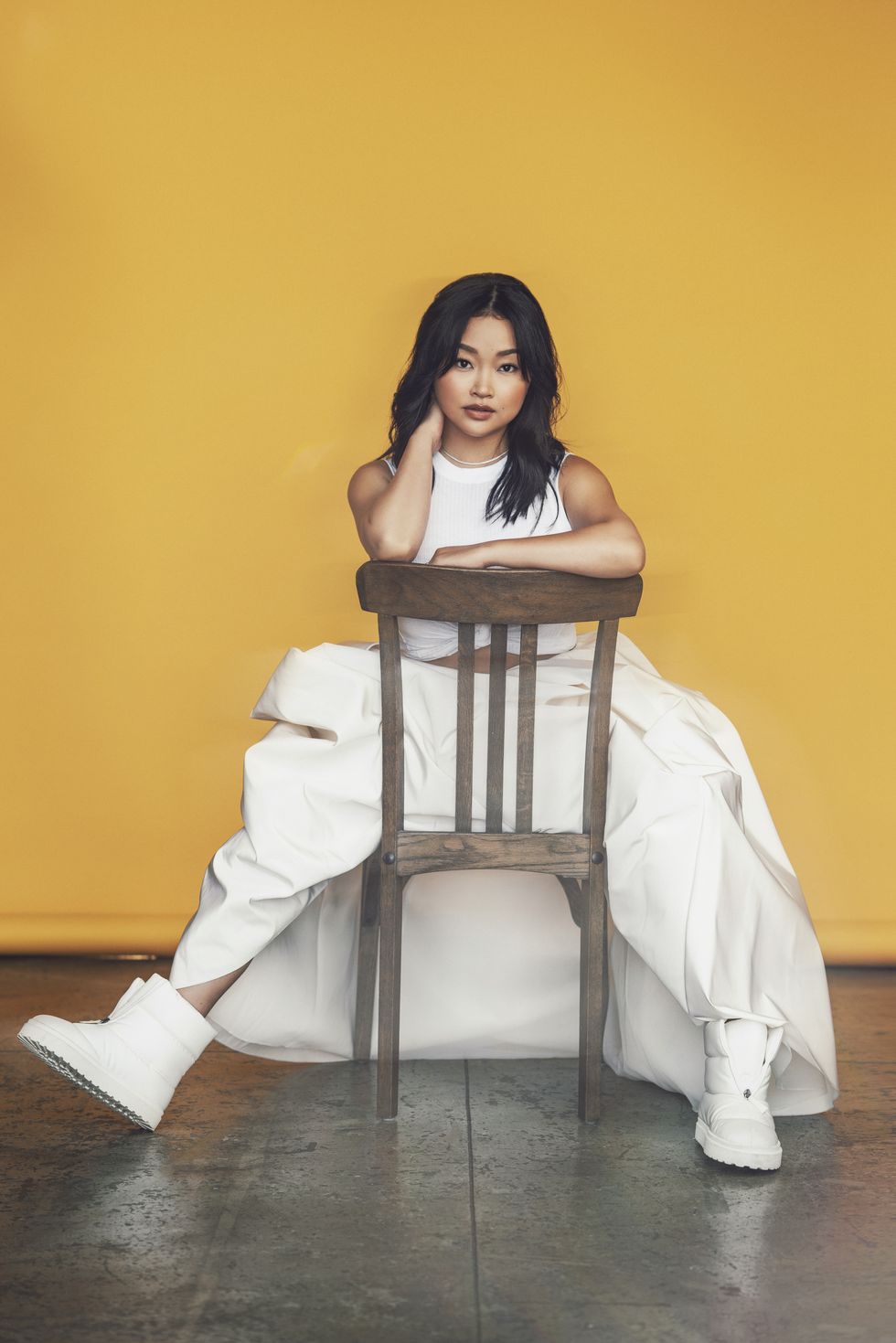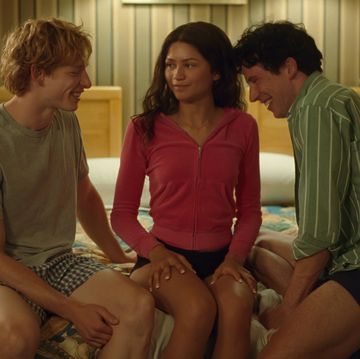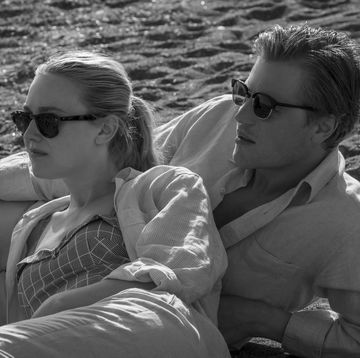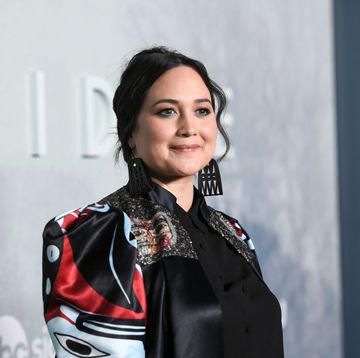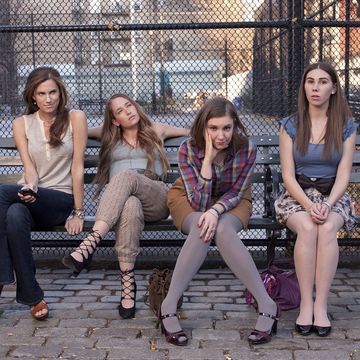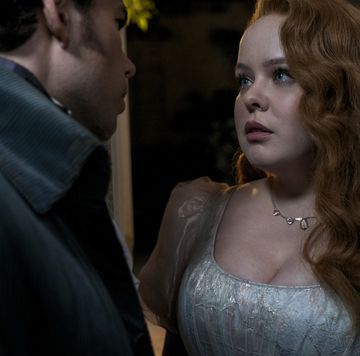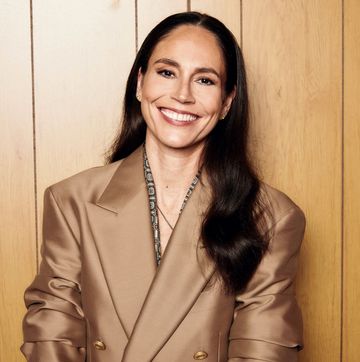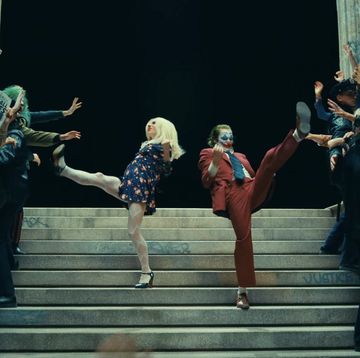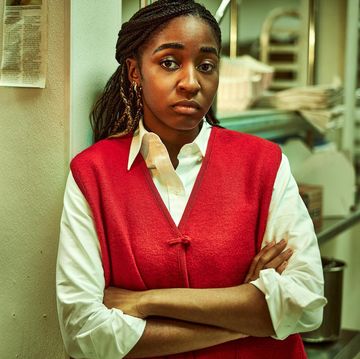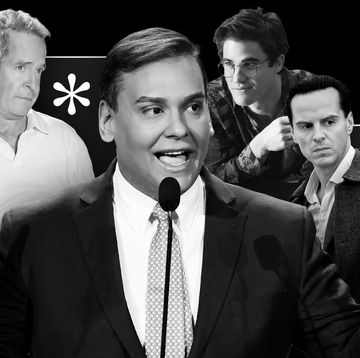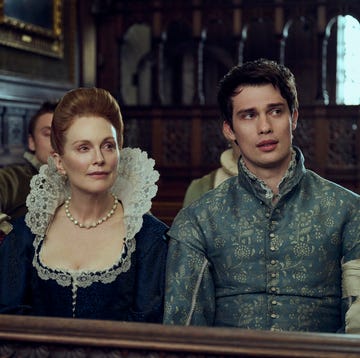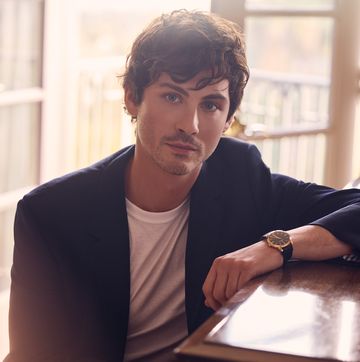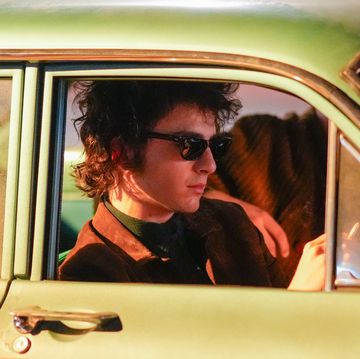After closing the chapter on her run as Lara Jean Covey in the beloved To All the Boys trilogy, Lana Condor was planning her next move when she received a screenplay from recent USC graduates Tim Schauer and Kuba Soltysiak, who had written a lead role with her in mind. It was a script that she couldn’t resist and, as she puts it, left her “on the floor laughing and freaking out.”
“I just felt that there was something so strong about a show that is raunchy and funny, and really doesn’t take itself seriously,” Condor tells BAZAAR.com in a Zoom interview from Los Angeles. “When you’re part of a show that is super campy and just there to really highly entertain your audience, a lot of that stress on an actor gets to go away, because then you can just play and have a lot of fun in the scenes and on set.”
Condor’s latest project, Boo, Bitch, is an eight-episode comedy miniseries streaming on Netflix. It follows Erika Vu (Condor), a high school senior who has lived her life safely under the radar with her best friend, Gia (Zoe Colletti). But with two months left until graduation, Erika decides that she wants to change her narrative—only to wake up the next morning and discover that she is a ghost with unfinished business.
“That initial raunchy, chaotic vibe was something that I hadn’t really done before and also was interested in, and I love to do shows that are pretty energetic and make you feel good,” Condor says.
Below, Condor speaks about the creative input that she had on Boo, Bitch as a first-time executive producer, her reaction to the online discourse surrounding her past and present projects, and the advice she offered her former To All the Boys costar Anna Cathcart, who has been shooting a spin-off series called XO, Kitty in South Korea.
Note: This interview contains spoilers for Boo, Bitch.
After To All the Boys, you found yourself in a very lucky position in the industry where you had a little more agency and choice over the roles that you wanted to play. How do you choose projects at this stage of your career?
Early on in my career, I was just like, “Yes, yes, yes, yes, yes,” to anything that came my way. Now, it’s much more about strategy and longevity, which is something that I think about a lot and is hard to attain, to be completely honest, especially in the social media world, where everything is kind of fast content, fast streaming now. I’ve learned the power of [saying] no.
Boo, Bitch is definitely an homage—like a farewell kiss—to high school, mainly just because I’m so much older. I actually recently got to play a lawyer my age in this movie that I did with Will Forte and John Cena [called Wile E. Coyote], and it was really, really rewarding to be able to play someone my age. It felt right, it felt natural, it felt like that’s what it was supposed to be. But a lot of the projects that we’re looking at are projects that may be something that I haven’t done before. I’m picking projects that will give me new tools for my acting tool belt—the joy in my job is to learn and try new things, and see what works and what doesn’t. Right now, we’re being pretty specific about wanting to attach myself to projects that will help people see me in a new light.
Boo, Bitch, at its core, is a love story—but instead of a romantic love between Erika and Jake C., it’s about the platonic, sisterly love that characters Erika and Gia share as best friends. What would you say Erika ultimately learns from the experience of losing, rekindling, and then losing once more her physical connection to Gia?
I love that you said that. It’s a love story, but it’s a love story rooted in friendship, and that was something very specific that, in the writers’ room, we really wanted to convey. Erika becomes, we like to call her, Bad Bitch Erika, and Bad Bitch Erika becomes the worst human. She’s deeply, deeply unlikeable; she is selfish; she is insulting; and she’s just such a rude person. And as we see that start to happen, Gia is there asking her to not let this power go to her head and trying to check her, trying to bring her back down.
As Erika starts to ascend into that Bad Bitch realm, everything about her just doesn’t hear or want to be bothered by anything Gia is saying. And then, as she is made to check herself, I think it’s a good lesson in [that] it’s never too late to change—and I believe that in my personal life. Even [after making] the worst mistakes in your life, you can always pull through, you can always change, and I think that’s a message that I’m hoping people might see if they choose to watch our show.
How long did you know about the big twist, that it was actually Gia who was a ghost and not Erika?
I knew … from the beginning. [My character is] the only person that can see Gia, and then Tenzing [Norgay Trainor]’s character can see Gia only if he’s intoxicated. So it was really important for all of the cast to make sure that they were never making eye contact with Zoe in the scene, that they were never acknowledging Zoe in the scene. Zoe had a very hard job, because [with] little things like walking through the door, she wouldn’t be able to take the handle, so I would always go first so that she could slip in after me. It obviously affected her character the most, but it affected everyone else as well, because we had to just make sure that we weren’t interacting with her except for myself.
Vu is a common Vietnamese surname. Even though Erika’s cultural identity isn’t at the forefront of her characterization, why do you think it is so important to have that cultural specificity?
When we were creating the characters and we were casting, I remember being pretty adamant about wanting to cast a Vietnamese family and wanting also for her to have a classic Vietnamese last name. It depends on the project, but I think that’s just something that I really wanted, because that family relationship is a different one. Her parents are super cool, her parents want her to go out, her parents flip her off, her parents are sassy. And especially when she goes to Bad Bitch [mode], they don’t take her shit, and I really wanted to show a Vietnamese family with those characteristics to kind of show the world that all families are different.
I think there might be this stereotype that is like, “Oh, all Asian people come from families [with] tiger moms and all these things.” As true as that is for someone’s experience, it’s not everyone’s experience, and I think it was really important for me to want to show kind of a crazy Asian family. Because they’re out there! That was another example of [how] me being a producer [meant] that request was actually listened to. I wouldn’t have had that power if I didn’t produce it and I was just acting in it.
With this show, you said you were able to tap into some of the darker humor that your mother has. How did you work to walk that fine line between playing this self-important mean girl at her worst and this teenage girl who is coming of age—and who still seems so familiar to you—at her best?
When I was shooting, I always looked at Erika as two characters: the Helen Who character, and then the Bad Bitch Erika. So I always approached it as if they were two different people. I would map out the arcs and the descent into the bitchiness. And then, the come-out of that. So in terms of the fine line, I would just have to really track and pay very close attention to the script. She literally has two personalities—and she does it very well, and it’s concerning how quickly she can change. So I would map that out in the script and find moments where that subtle change started to happen, and then make those changes from there on. So I’m kind of going back and forth from being the Bad Bitch to Helen Who. I gotta say that was pretty challenging for me, because it was like I had two jobs, and there were some learning curves there and definitely a lot of stamina building for sure.
In terms of inspiration, I watched Mean Girls or something like that for Bad Bitch, but I didn’t want her to totally lose herself, because [seeing a character be] mean—and especially mean in YA, high school shows—is often just not believable. It can be played so campy and not believable, so I did still want, in my meanness and in that genre, to try and have a little bit of humility in it.
There has always been some social media chatter about Asian female leads rarely having Asian or other people of color as love interests—and that discussion has extended to your own body of work. What are your thoughts on Asian representation in interracial relationships onscreen?
That’s a great question. That actually has come up before—and I really do want to educate myself and read the articles that are out there about it, or the criticism that’s out there about it. So I hope I can answer this in the way you’re truly asking, but my approach to this is really like, I do believe that anyone can love whomever they so choose, and all relationships don’t look the same.
I’m in a mixed relationship with my fiancé. I come from a mixed home, I was adopted in Vietnam and brought to America, and my mom’s Irish and my dad’s German, and I love him very, very much. So to me, in terms of the work that I have done where that has been reflected—like To All the Boys, for example, although we did have John Ambrose—I was so used to that love because that is how I grew up, in terms of being raised by a father that I love so deeply, who happens to be white.
So for me, when I see these interracial couples on film and television, I think it’s beautiful because it shows that love can be and should be for everyone, no matter how they look. So that’s kind of my take on it, but I’m also so curious and interested in reading other people’s opinions about it as well, because ultimately, I’m not the casting director—although sometimes I wish I was. Sometimes I really wish I was! But it’s not really something that I have a lot of control over, so it’s a great question for [the people in charge].
After the success of To All the Boys, a lot of people on social media were wondering why you weren’t immediately up for the same roles as your costar Noah Centineo, even if you had a bevy of projects that you couldn’t talk about yet. How did you react to those comments?
I rarely go on Twitter, but the one day I went on Twitter, I saw that that was a conversation … and I had projects lined up that I just couldn’t talk about. I think, if anyone ever was to compare Noah and I, that’s the craziest comparison. He’s, like, a six-foot man, and I’m a five-foot-four Asian woman—we are nothing alike! We’re alike in terms of, like, we’ve picked up certain mannerisms from each other, because we worked together for four years.
There’s so much that happens behind the scenes that no one knows about. They have no idea what projects I have coming out, they have no idea who I’m meeting or what I’m doing, and I’m sure they had [the] best intentions by saying these things—of course—but we don’t need to compare each other. I know that they have my best interests at heart, but it also kind of made me feel like, “No, guys! I’m doing things! I’m just not being loud, and I’m trying to keep things close to my heart.” And until something comes out, I like to keep it a secret, because you never know if it’ll fall through.
Anna Cathcart is currently leading her own To All the Boys spin-off series. Have you spoken with her at all or offered her any advice as she has assumed this new role as leading lady?
I’ve talked to her a ton—a lot during preproduction for sure. Once she started filming, I didn’t want to bother her. But during preproduction, she had a lot of questions. I mean, she has to carry this now. We created this rom-com franchise, but I was always kind of carrying it, and it was tough. It’s interesting because rom-coms are so fun and lovable to watch, so you think, “Oh, it’s probably so easy to make,” and it’s actually really just the opposite. So we were talking about stamina, about conserving your energy, speaking up for yourself. If you don’t feel comfortable doing something, or you don’t feel comfortable wearing something, or you just simply don’t feel comfortable, you gotta stand up for yourself and tell someone, because I’ve suffered in silence for certain projects or moments, and that never ends well.
So giving her that type of advice and also being like, “Anna, you’ve got this. You were in all three of them. You were arguably the most likable character on the screen. Every time you were onscreen, you got a laugh. Everyone loves watching you. You totally got this. This is your time. Knock it out of the park.” And I know she will—I think she’s going to be freaking amazing, and it’s going to be cool to see her all grown up, too, because Anna’s not a kid anymore.
Is there ever a world in which you would consider making a cameo appearance, or do you feel like you’ve wrapped up your time in that franchise?
It’s interesting, because I do feel that I have done everything. I dedicated four years of my life to doing those [movies]—I would shoot them, then do press, then shoot them, and then do press. I love the franchise, and I will always be incredibly grateful. But on the third press tour, I felt like I had wrapped it up in a bow and was ready to pass it on to Anna for sure.
I mean, never say never. Of course, in the future, if that’s something that anyone ever wants to come to me in the future with, I think it would be very interesting to see where [Lara Jean and Peter] are at, especially if they stuck together or whatnot, or what she’s doing in her career. I think that would be interesting, but for now, I do think that I wrapped it up pretty well.
This interview has been edited for length and clarity.
Boo, Bitch is now streaming on Netflix.
Photographer: Cibelle Levi | Makeup: Melissa Hernandez | Hair: Kat Thompson | Hair Assistant: Becca Mader | Styling: Erin Walsh | Styling Assistant: Annie Easton

Max Gao is a freelance entertainment and sports journalist based in Toronto. He has written for The New York Times, Los Angeles Times, NBC News, Sports Illustrated, The Daily Beast, Harper’s Bazaar, ELLE, Men's Health, Teen Vogue and W Magazine. Follow him on Twitter: @MaxJGao.
